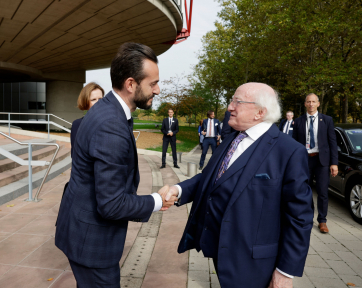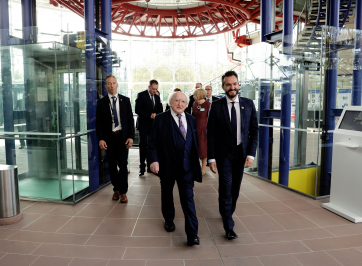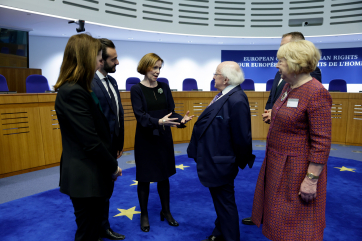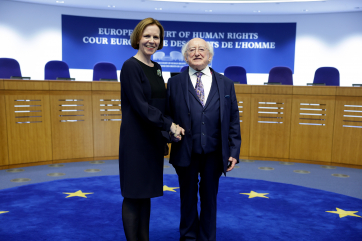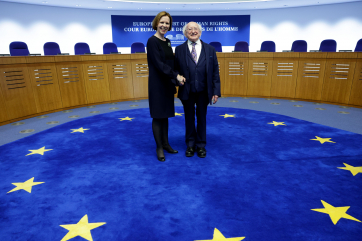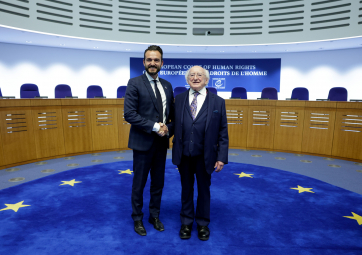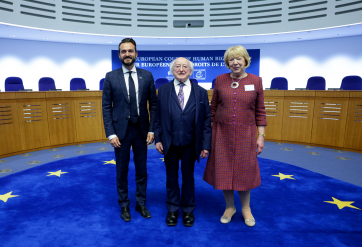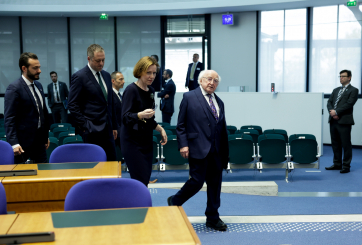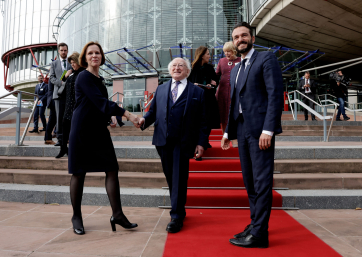Speech at a State Dinner in honour of H.E. Mr. Marcelo Rebelo de Sousa, President of the Portuguese Republic
Áras an Uachtaráin, Wednesday, 19th October 2022
*check against delivery*
Your Excellency - A Shoilse, an t-Ollamh –
Professor Marcelo Rebelo de Sousa, President of the Portuguese Republic,
A Thaoisigh,
Airí an Rialtais,
A Aíonna Uaisle Uilig,
A Cháirde,
May I say how delighted my wife Sabina and I are to welcome you, President Rebelo de Sousa, and your Delegation to Ireland and to Áras an Uachtaráin, the home of all Irish Presidents since 1938, and to have the honour of returning the kind hospitality which Sabina and I so enjoyed during our State Visit to Portugal in December 2015.
Ireland and Portugal share a rich and ancient history. It is one that can be traced back to the mists of antiquity. Archaeological evidence from the Iron, Bronze and Megalithic periods charts the earliest contacts between the Iberian Peninsula and Ireland, while DNA analysis conducted more recently suggests, based on evidence from the last Ice Age, that the Portuguese-Iberian peoples were ancestors to the Gaelic Irish.
The links between our two nations continued to develop, including during the medieval period, when trade increased between Irish and Iberian ports, as Irish mercenaries, pilgrims and scholars found sanctuary in Portugal.
By 1450 merchant traders along the south and west coast of Ireland in particular had a key role in controlling the wine trade between Ireland and the Iberian Peninsula. Portuguese wine was imported, along with silver, textiles, ceramics and leather. Among Irish exports to the Iberian Peninsula were salted fish, beef, wool and timber, as well as wolf-hounds and hawks.
During the Cromwellian war in Ireland in the mid-17th century, and in the centuries which followed, increasing numbers of Irish people were forced to leave Ireland, due to persecution of their religious beliefs, seeking refuge overseas.
Indeed, emigration is a shared experience, now in both of our cases it is an inward flow, but we both have a valued diaspora. Many Irish migrants in the centuries of emigration settled in Portugal, including in the University cities of Lisbon, Coimbra and Évora. This formed a firm foundation for commercial, cultural and intellectual exchanges.
Perhaps one of the most enduring testaments to Portuguese-Irish relationships is to be found in the historic suburb of Belem in Lisbon. Sabina and I had the pleasure of visiting Bom Sucesso, founded by an Irish Dominican priest Father O’Daly and Portuguese countess Iria de Brito in 1639 to establish a convent for young women who were unable to become nuns in their homeland because of religious persecution.
One of the few churches in Lisbon that survived the earthquake of 1755, it remains today an important reminder of a significant chapter in a shared Church history and the international assistance made possible by two brave individuals.
This connection has been well-documented in work by the late and much-lamented distinguished Irish historian Sister Margaret Mac Curtain, a member herself of the Dominican Order.
Then, too, we think of the establishment of the Irish College of St Patrick in Lisbon, which operated as a seminary for clerical students until the mid-1830s, offering refuge from persecution.
As the Sisters’ mission in Lisbon has since concluded, and likewise that of the Irish Dominican Fathers who completed their mission in 2021 following more than 400 years of service, tonight I avail of this opportunity to acknowledge the legacy of the Irish Dominicans for their contribution of so much to the ties between our two countries over the centuries.
Between the 18th and 19th century, essential commercial and cultural links emerged between the ports of Cork and Lisbon. A number of prominent Cork-based merchant families, including the Barry, Gould and Gallwey clans, became influential figures in the banking, business and cultural sectors in Lisbon.
Worthy of recall too is the academic, author and Catholic priest Conor O’Mahony, who was educated and spent most of his latter life in Portugal who is best known for his 1645 work Disputatio apologetica de iure regni Hiberniae pro Catholicis Hibernis adversus haereticos Anglos (“An Argument Defending the Right of the Kingdom of Ireland for Irish Catholics against English Heretics”), which, in the context of the Irish Confederate Wars, was one of the most radical Irish nationalist arguments for full national sovereignty, calling for the restoration of the Gaelic kingship and creation of an explicitly Catholic state.
As to the Portuguese who made a name here in Ireland, perhaps one of the most notable historical figures must be that of William Moses Annyas Eanes, the Irish-Portuguese politician who, in 1555, was elected mayor of Youghal in County Cork. He was the first member of the Jewish faith to hold such an elected position in Ireland. His grandfather was a Marrano Jew who had emigrated from Belmonte in north-east Portugal.
In all periods of our shared relationship there is the importance we have accorded to the seas and ocean that surround us, and the profound ways in which our proximity to water has shaped us socially, culturally and economically.
May I take this opportunity of congratulating Portugal for co-hosting, with Kenya, the United Nations Ocean Conference in June this year. This was so important and came at a critical time as the world is seeking to address many of the deep-rooted problems of our societies laid bare by the pandemic, by an ongoing and deepening set of consequences from climate change, and which will require major structural transformations and common shared solutions that are anchored in the UN 2030 Agenda.
While a political declaration was achieved in Lisbon as to our oceans, I hope that efforts will resume with appropriate urgency to move past the devastating consequences of the failure to have a binding agreement. If we want to address some of the most defining issues of our time, such as climate change, food insecurity, diseases and pandemics, diminishing biodiversity, economic inequality, and conflicts and strife, we must act now to protect the state of our oceans.
It is not just on maritime matters, of course, that our two countries share common contemporary interests. We are natural allies in demonstrating a strong tradition of working together in partnership in major intergovernmental organisations, especially in the European Union, where we continue to work in solidarity with each other and with our fellow EU Member States, to further the foundational European project, of promoting the values of solidarity, inclusivity, equality and cohesion, for all member nations and their peoples.
The Conference on the Future of Europe represented a positive step in the realisation of a deeper and more inclusive experience of European democracy.
Policymakers will need to use the experience as a catalyst for more comprehensive change, moving much beyond the kind of citizen engagement pioneered during the conference, and in giving it an appropriate reflection language and response. It is time for leaders of the EU institutions to match the ambition identified by citizens during this series of debates and discussions.
Today Ireland and Portugal share a common perspective on many issues at European level, some of the most pressing of which we discussed at our recent meeting of the Arraiolos Group in Malta just two weeks ago.
Our common perspective includes a desire to hold onto the great moments of hope in recent years that are represented by,for example, agreements such as that achieved in Paris on climate change, and the Sustainable Development Goals, but also the importance we attach to the challenging but necessary work of envisaging the future of Europe in all its cultural diversity and the role that arts and culture have in the important task of bringing about a European Union that places culture at its core.
Our two countries as will be exemplified later share a rich musical tradition stemming from ancient times, a traditional music in the forms of Irish Sean Nós and Portuguese Fado music both of which are often characterised by exile, melancholic emotionally resonant tunes and lyrics, frequently invoking the sea, the émigré, the poor, the disenfranchised and repressed, and infused with a sentiment of resignation, fate and melancholy. There are atmospheres and themes that are shared in Sean Nós and Fado singing, and I am sure that long, robust conversations have been had on which style and in what circumstances which originally influenced the other!
While on the subject, of music in culture may I thank our exceptionally talented performers this evening, Séamus and Caoimhe Uí Fhlatharta, for their Sean Nós performance which we will soon enjoy.
It is not only in music that we share significant cultural achievements. Both of our peoples value works and words of the imagination.
There is so much that we share and can build upon. Our locations on the periphery of Western Europe, our common Atlantic-facing heritage, our outward-looking global perspectives and likewise our strong connections with our respective Diasporas abroad all form a solid foundation for us to engage with and work alongside each other.
Although our stories unfolded during different times, in different contexts with different consequences, certain parallels can be identified in how our two countries have each sought to achieve and sustain independence, to achieve republics that can reflect our best human qualities: compassion, inclusivity, solidarity and equality. We have also each sought to consolidate and promote democracy at national and international levels, often in challenging circumstances.
In Ireland, and in the context of marking the centenary of our War of Independence, subsequent Civil War and other major events from which our State emerged in 1922, I have been pleased to initiate a series of seminars entitled “Machnamh”, an ancient Irish term which encompasses reflection, contemplation, meditation and thought.
Involving leading scholars from different backgrounds and an array of perspectives, it has enabled the sharing of insights and views on the context and events of that formative period of Irish history and on the very nature of commemoration itself.
As Portugal approaches the upcoming 50th anniversary of your transition to democracy in 2024, I am aware that you, President, have already begun to lead discussion on the events and influences that have brought Portugal to its present stage of development and also on the path that lies ahead for your country. I wish you and all Portuguese people well on your own journey of commemoration and renewal. It is a journey that is so worthwhile.
As to envisaging our future together in our shared European Union, we are challenged to advance a critical debate on the future of the achievement of such values as multi-lateralism, peace, democratic life, security and freedom. As members of the European Union, and having joined the United Nations on the same day in 1955, Ireland and Portugal are united in our commitment to supporting the interests and those of the world as a whole through our unbreakable support for a fair, just and rules-based multilateral system, one that can address issues such as global poverty, crippling debt, unfair trade and the sources of conflict and displacement.
It is with shock and horror that we continue to witness the ongoing consequences of the invasion that has been unleashed against Ukraine and its people by Russia. This imperialist, illegal action contravenes international law, humanitarian law and the UN Charter itself. This return to war in Europe, such abuse by a powerful member of the United Nations of its neighbour, the flagrant violations of the principals of the United Nations, bring into sharp focus for us the devastating loss of life, homes, infrastructure and livelihoods that war brings, how it contravenes our common humanity.
There are so many issues that we must address with urgency. Our planet burns. Losses in biodiversity in so many forms are reaching irreversible levels. Global hunger is rampant among those dispossessed by the effects of climate change. Famine wages across the Horn of Africa. We are being distracted from so much that is important, including reaching our Sustainable Development Goals.
We are charged, all of us global citizens, to find ways of coming together to tackle together these great crises which threaten our very survival on this vulnerable planet which we call home. This challenges our authenticity in relation to multilateralism.
In doing so, we may assist in the rebuilding of trust, legitimacy, social cohesion, tackling the democratic crisis that has spread across our Union and beyond which has been so socially ruinous. We must make a better effort to engage our citizens with the values, principles and decisions of our multi-lateral institutions – institutions which are their institutions, and their best protection and hope for the future.
President, may I conclude by wishing every blessing on your visit to Ireland. May it be one that is stimulating, fruitful and enjoyable.
I am certain that it will encourage and deepen the friendship between our peoples.
In that spirit, your Excellency, please join me in a toast:
To your good health,
to the Republic of Portugal and its people,
and to the bonds of friendship between our two countries and our peoples.
May they deepen in conditions of peace and friendship.

